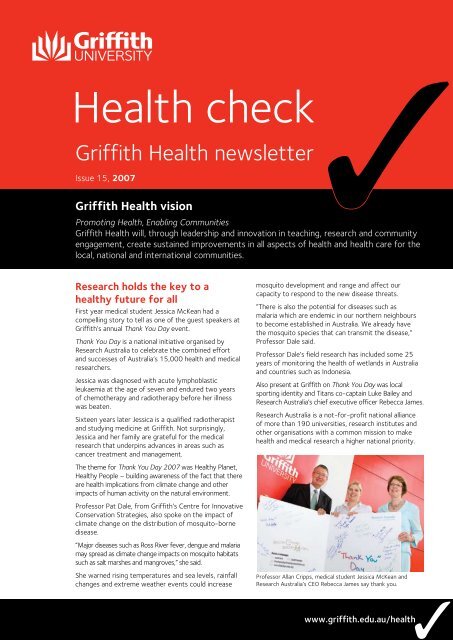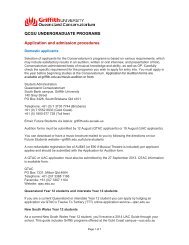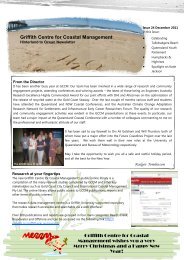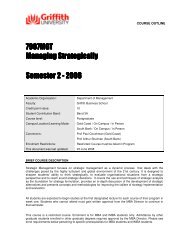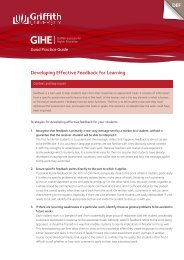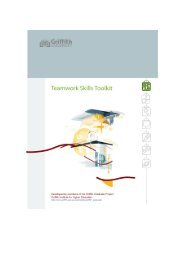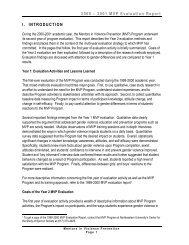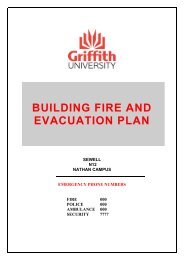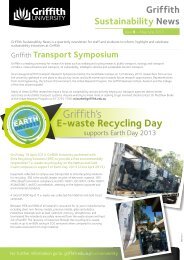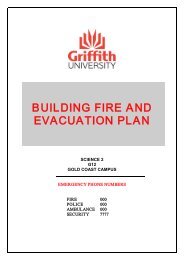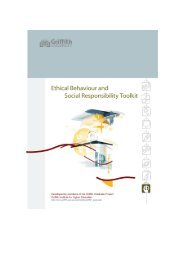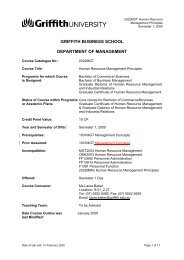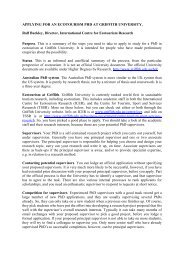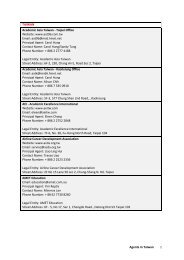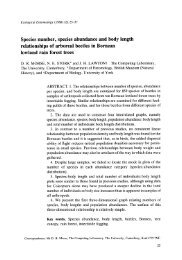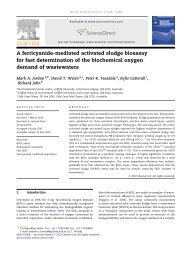Health Check Issue 15 2007 ( PDF 439k) - Griffith University
Health Check Issue 15 2007 ( PDF 439k) - Griffith University
Health Check Issue 15 2007 ( PDF 439k) - Griffith University
Create successful ePaper yourself
Turn your PDF publications into a flip-book with our unique Google optimized e-Paper software.
3<br />
<strong>Health</strong> check<br />
<strong>Griffith</strong> <strong>Health</strong> newsletter<br />
<strong>Issue</strong> <strong>15</strong>, <strong>2007</strong><br />
<strong>Griffith</strong> <strong>Health</strong> vision<br />
Promoting <strong>Health</strong>, Enabling Communities<br />
<strong>Griffith</strong> <strong>Health</strong> will, through leadership and innovation in teaching, research and community<br />
engagement, create sustained improvements in all aspects of health and health care for the<br />
local, national and international communities.<br />
<strong>Health</strong> check<br />
Research holds the key to a<br />
healthy future for all<br />
First year medical student Jessica McKean had a<br />
compelling story to tell as one of the guest speakers at<br />
<strong>Griffith</strong>’s annual Thank You Day event.<br />
Thank You Day is a national initiative organised by<br />
Research Australia to celebrate the combined effort<br />
and successes of Australia’s <strong>15</strong>,000 health and medical<br />
researchers.<br />
Jessica was diagnosed with acute lymphoblastic<br />
leukaemia at the age of seven and endured two years<br />
of chemotherapy and radiotherapy before her illness<br />
was beaten.<br />
Sixteen years later Jessica is a qualified radiotherapist<br />
and studying medicine at <strong>Griffith</strong>. Not surprisingly,<br />
Jessica and her family are grateful for the medical<br />
research that underpins advances in areas such as<br />
cancer treatment and management.<br />
The theme for Thank You Day <strong>2007</strong> was <strong>Health</strong>y Planet,<br />
<strong>Health</strong>y People – building awareness of the fact that there<br />
are health implications from climate change and other<br />
impacts of human activity on the natural environment.<br />
Professor Pat Dale, from <strong>Griffith</strong>’s Centre for Innovative<br />
Conservation Strategies, also spoke on the impact of<br />
climate change on the distribution of mosquito-borne<br />
disease.<br />
“Major diseases such as Ross River fever, dengue and malaria<br />
may spread as climate change impacts on mosquito habitats<br />
such as salt marshes and mangroves,” she said.<br />
She warned rising temperatures and sea levels, rainfall<br />
changes and extreme weather events could increase<br />
3<br />
Editorial Co-ordinator: Sue Gibbons<br />
Email: s.gibbons@griffith.edu.au<br />
mosquito development and range and affect our<br />
capacity to respond to the new disease threats.<br />
“There is also the potential for diseases such as<br />
malaria which are endemic in our northern neighbours<br />
to become established in Australia. We already have<br />
the mosquito species that can transmit the disease,”<br />
Professor Dale said.<br />
Professor Dale’s field research has included some 25<br />
years of monitoring the health of wetlands in Australia<br />
and countries such as Indonesia.<br />
Also present at <strong>Griffith</strong> on Thank You Day was local<br />
sporting identity and Titans co-captain Luke Bailey and<br />
Research Australia’s chief executive officer Rebecca James.<br />
Research Australia is a not-for-profit national alliance<br />
of more than 190 universities, research institutes and<br />
other organisations with a common mission to make<br />
health and medical research a higher national priority.<br />
Professor Allan Cripps, medical student Jessica McKean and<br />
Research Australia’s CEO Rebecca James say thank you.<br />
www.griffith.edu.au/health3
Inside this issue<br />
3 CAM on the curriculum<br />
3 Australian Teacher of the Year<br />
3 First social work graduates<br />
3 Innovation challenge win!<br />
Research overview<br />
<strong>Griffith</strong> <strong>Health</strong>’s research strengths<br />
have been recognised by a best<br />
ever outcome in the recent national<br />
competitive research rounds.<br />
Researchers in <strong>Health</strong> won 10 of<br />
<strong>Griffith</strong>’s recently announced 36<br />
grants across the ARC Discovery, ARC<br />
Linkage, ARC Linkage International, and<br />
NHMRC Project Grants.<br />
Total funding awarded to health<br />
researchers was $4,012,947 for<br />
projects ranging across the biomedical<br />
sciences, health services, psychosocial<br />
and public health research.The funded<br />
work will address a diverse range of key<br />
health issues including understanding<br />
basic biomolecular processes involved<br />
in tumour formation, prevention of<br />
infection in intravenous catheters, and a<br />
randomised trial of counselling programs<br />
to address post natal depression.<br />
Our goal is to do research that will<br />
benefit people’s health, and this year’s<br />
success gives us the funding to push<br />
ahead with that agenda. I congratulate<br />
all our successful researchers on<br />
gaining the crucial funding to support<br />
their work.<br />
<strong>Griffith</strong> <strong>Health</strong>’s success reflects a<br />
combined effort to ensure researchers<br />
develop the best possible applications.<br />
Peers in our Schools and Research<br />
Centres help each other develop and<br />
refine the research ideas, training<br />
sessions on the funding bodies and<br />
application processes are offered by<br />
the Office for Research, and feedback<br />
on draft applications is provided.<br />
Our processes are intended to make<br />
sure our best creative ideas are<br />
developed to quality applications. For<br />
the forthcoming grant round we need<br />
to make sure we keep building on our<br />
current success.<br />
Professor Kim Halford, Director of the<br />
<strong>Griffith</strong> Institute of <strong>Health</strong> and Medical<br />
Research.<br />
Bone Research Team: Sebastien Stephens, Dr Alex Stephens, Rouha Granfar, Associate Professor<br />
Nigel Morrison and Niki Koutifides<br />
Bone research win<br />
Bone cell research in the School of Medical Science has received a significant boost<br />
with the awarding of two National <strong>Health</strong> and Medical Research Council (NHMRC)<br />
grants to Associate Professor Nigel Morrison.<br />
Together with another NHMRC funded study already underway into the regulation<br />
of bone formation, the grants bring $1.4million over four years to a better<br />
understanding of bone metabolism.<br />
According to Associate Professor Nigel Morrison, his research group is one of<br />
the few who investigate both the underlying drivers of bone formation and bone<br />
resorption. The two processes need to be in careful balance to avoid bone disease<br />
such as osteoporosis.<br />
One of the new projects will investigate the internal chemical controls over the<br />
development and activity of osteoclasts, the cells which resorb or destroy bone.<br />
“A number of proteins known as chemokines are involved in the early differentiation<br />
of osteoclasts from their precursors. It appears that the first stage of differentiation<br />
may be an inflammatory process, with these chemokines signalling and drawing in<br />
other cells to form the giant, highly specialised osteoclast.”<br />
Associate Professor Nigel Morrison said his primary motivation for the research was<br />
intellectual curiosity. However chemokines have also been recognised as potential<br />
targets for new therapies for disease such as arthritis.<br />
“The basic science of this cell is fantastic. If osteoclast differentiation and activity<br />
can be controlled, the skeletal side effects can be reduced and disease ameliorated.”<br />
The other new project with colleagues Professor Ifor Beacham and Dr Ian Peak will<br />
investigate the body’s response to infection with Burkholderia pseudomallei. The<br />
bacteria causes the potentially fatal disease melioidosis, which is endemic in tropical<br />
and subtropical regions.<br />
“Immune cells known as macrophages would normally kill bacteria in the body by<br />
absorbing the intruders and then committing cell suicide. Instead, Burkholderia<br />
seems to avoid the immune system by turning the macrophage into an osteoclastlike<br />
cell.”<br />
He said bone was an unappreciated site of latent infection with B pseudomallei but<br />
the way the bacteria appeared to subvert the normal host response was intriguing.<br />
Associate Professor Nigel Morrison has been at <strong>Griffith</strong> for ten years and during that<br />
time has mentored numerous undergraduates into promising research careers.<br />
“The advantage of teaching is to recognise and encourage good students,” he said.<br />
He describes his research and that of his team as ‘the green jungle of discovery’<br />
where ‘every time time you go in, you find something new’.<br />
“Interesting things are happening all the time. I like new discovery and having a<br />
research group that are your intellectual equals and are constantly generating new<br />
ideas. The mix of expertise in a group means people are seeing things differently and<br />
can contribute in a synergistic way.”<br />
2<br />
<strong>Health</strong> check
Nursing research to<br />
review management of<br />
peripheral catheters<br />
Professor Claire Rickard<br />
Painful, timeconsuming,<br />
costly<br />
and wasteful<br />
– that’s what<br />
some experts<br />
think about<br />
the practice of<br />
routinely removing<br />
and re-inserting<br />
the peripheral<br />
catheters that<br />
provide patients<br />
with life-saving<br />
fluids.<br />
Now a definitive study led by acute<br />
and critical care specialist Professor<br />
Claire Rickard, from <strong>Griffith</strong>’s Research<br />
Centre for Clinical and Community<br />
Practice Innovation, will help provide<br />
the evidence on whether or not the<br />
practice is ineffective and unnecessary.<br />
“In Australia each year about ten million<br />
peripheral catheters are inserted in<br />
patients’ arms or in the backs of their<br />
hands to administer blood products,<br />
fluids or medications,” she said.<br />
“Many of those catheters are routinely<br />
re-sited every few days because we<br />
thought that helped prevent infection,<br />
however there is little evidence to<br />
justify the practice.”<br />
Professor Rickard said unless there was<br />
a clinical reason for moving a catheter<br />
such as a blockage or irritation of the<br />
vein, it was probably more convenient<br />
and cost effective to leave them alone.<br />
“Our previous trials in subgroups of<br />
patients in Queensland, Victoria and<br />
Tasmania have found no difference in<br />
infection risk with routine re-siting of<br />
catheters.”<br />
“Patients have to undergo the pain of<br />
another needle, it is disruptive to their<br />
therapy, and it wastes the time of both<br />
doctors and nurses. Plus there is the<br />
environmental costs of all that plastic<br />
waste,” she said.<br />
The study, to be conducted at the Gold<br />
Coast, Princess Alexandra and Royal<br />
Brisbane and Women’s Hospitals, will<br />
involve more than 3,000 patients. It is<br />
funded by a $428,750 grant from the<br />
National <strong>Health</strong> and Medical Research<br />
Council.<br />
A healthy start to life<br />
Accurately identifying women at risk of emotional distress<br />
after childbirth and providing an effective and accessible<br />
intervention to improve their mental health is the aim of<br />
a new study funded by the National <strong>Health</strong> and Medical<br />
Research Council.<br />
Led by Professor Debra Creedy, Dean (Academic) of<br />
<strong>Griffith</strong> <strong>Health</strong>, and Master of Midwifery Convenor Dr Jenny<br />
Gamble, the study will support a more positive transition to<br />
motherhood for many women.<br />
“Previous studies have shown surprisingly high rates of<br />
depression, anxiety and stress in women following childbirth,”<br />
Professor Creedy said.<br />
“More than 30 per cent of women experience distress as a<br />
result of factors such as the pain, fear and even unexpected<br />
medical interventions associated with childbirth.“<br />
“Yet previous studies have found only 14 per cent of<br />
new mothers report anyone asking them about their birth<br />
experience. Sadly, there appears to be a gap in regards to our<br />
emotional care of women at this important time.”<br />
She said mental health problems in new mothers could also<br />
contribute to problems with infant attachment, and tensions<br />
in couple relationships and broader family interaction.<br />
The randomised controlled trial will test the impact of brief<br />
counselling by trained midwives for new mothers while in<br />
hospital and four to six weeks after the birth of their babies.<br />
A control group of mothers will receive the same level of contact<br />
with a midwife but the content will focus on babycare.<br />
“This study has the added advantage of improving the skill<br />
base of midwives to support and promote the mental health<br />
and wellbeing of women in their care.”<br />
Happy, healthy mothers are best for babies.<br />
She said a pilot study found that women who received<br />
counselling were less depressed, less stressed, had less selfblame<br />
and were more confident about a future pregnancy<br />
than other women.<br />
The new study, involving collaborators from Curtin <strong>University</strong><br />
of Technology, Charles Darwin <strong>University</strong>, <strong>University</strong> of<br />
Melbourne and Karolinska Institute in Sweden, will recruit<br />
some 1200 women in their third trimester of pregnancy from<br />
public and private hospitals across Queensland and Western<br />
Australia.<br />
3<br />
www.griffith.edu.au/health
Associate Professor Elizabeth Kendall<br />
Community health partnership<br />
wins major research dollars<br />
Associate Professor Elizabeth Kendall will lead a<br />
$1.35 million Australian Research Council (ARC)<br />
project in partnership with Queensland <strong>Health</strong><br />
focusing on community-based chronic disease<br />
research in the Logan-Beaudesert area.<br />
Associate Professor Kendall said she was<br />
delighted the project had received support<br />
since there was clearly a lack of integrated<br />
health services in the face of high rates of<br />
chronic diseases in the community.<br />
“People with chronic diseases such as diabetes,<br />
respiratory and cardiovascular disorders are<br />
currently supported by too many dispersed<br />
service providers leading to delays, gaps and<br />
duplication of services.”<br />
Associate Professor Kendall said the project<br />
would help to manage and prevent chronic<br />
diseases in the region by creating sustainable<br />
partnerships with existing service providers in<br />
the Logan and Beaudesert areas.<br />
“This is the largest single initiative to date bringing<br />
together academics, GPs, community health<br />
carers, non-government agencies, and both local<br />
and state governments, to plan for local health<br />
needs,” Associate Professor Kendall said.<br />
“We are gathering chronic disease-related data<br />
and developing an information platform, so<br />
critical knowledge is shared and available to<br />
those who need it for health planning.<br />
“We are also investigating processes to improve<br />
service providers’ decision-making and enable<br />
better services for chronic disease patients.”<br />
Deputy Vice Chancellor Research Professor<br />
Lesley Johnson, said the project demonstrated<br />
the <strong>University</strong>’s strength in collaborative and<br />
socially engaged research.<br />
“<strong>Griffith</strong> researchers have recently attracted<br />
$14.3 million from ARC, industry and National<br />
<strong>Health</strong> and Medical Research Council for<br />
projects which will ultimately benefit the<br />
community.”<br />
Conflict in customer relations comes under<br />
the spotlight<br />
Everyone has stories of frustrating or difficult interactions with call centres,<br />
banks, telcoms or government agencies but spare a thought for the<br />
employees on the other side of the conflict.<br />
They may also feel dissatisfied, angry or emotionally exhausted at the end<br />
of the dispute and are then expected to deal with the next customer in a<br />
calm and professional manner.<br />
School of Psychology’s Dr Graham Bradley leads a new research project<br />
that aims to tease out the factors that can escalate or otherwise retrieve<br />
situations of alleged failures in service delivery.<br />
“We want to know what people say and do that gets the other person’s<br />
back up and too often leads to cycles of incivility. On the other hand, what<br />
are the skills that can lead to brilliant recoveries from difficult situations?”<br />
“Given that 75 per cent of people work in a service industry and many<br />
face these encounters on a daily basis, there is enormous potential for<br />
cumulative stress and burnout.”<br />
He said chronic workplace stress can have health implications for<br />
individuals, affect relationships at home and at work, and have financial<br />
implications for employers in terms of absenteeism, workers’ compensation<br />
and the costs associated with rehiring or retraining staff.<br />
Dr Bradley said it was sometimes unrealistic to expect front line employees<br />
to keep the customer happy at all costs within the context of time and<br />
workload pressures.<br />
“It is very hard to provide 100 per cent error-free, good humoured and<br />
efficient service throughout an entire shift,” he said.<br />
Strategies often used to defuse conflict included offers of compensation,<br />
empowering the customer to suggest solutions and offering them choices.<br />
Excuses, shifting the blame, counter-arguments and defensiveness were<br />
rarely successful.<br />
“We want to help create win-win solutions – strategies that will leave the<br />
customer satisfied and are good for business, but will not drain the service<br />
provider.”<br />
Dr Bradley said the project, which brings experts in marketing and<br />
customer loyalty together with experts in organisational stress, hopes to<br />
identify new and unexpected strategies for improving interactions with<br />
customers.<br />
The research is funded by the Australian Research Council and involves<br />
collaboration with the <strong>University</strong> of Queensland and the Wolfgang Goethe<br />
<strong>University</strong> in Germany.<br />
Dr Graham Bradley leads research that will reduce conflict in customer service encounters.<br />
4<br />
<strong>Health</strong> check
Research supports CAM education<br />
Dr Evelin Tiralongo has a passion for the inclusion of<br />
complementary and alternative medicines (CAM) training in<br />
core teaching curricula for pharmacy, nursing and medical<br />
students around the country.<br />
The School of Pharmacy lecturer believes health professionals<br />
have a responsibility to understand CAM, given that more than<br />
half of the population already use herbal medicines, vitamins<br />
and minerals, and therapies such as acupuncture.<br />
“Our National Medicines Policy for example covers prescription<br />
and non-prescription medicines as well as complementary<br />
medicines.”<br />
“Given pharmacists’ ethical and legal responsibility to counsel<br />
patients on medicines they supply, we need to ensure<br />
graduates have a reasonable knowledge of CAM and the<br />
ability to evaluate evidence for its effectiveness.”<br />
research component of the Graduate Certificate in Higher<br />
Education which she completed at <strong>Griffith</strong> last year.<br />
“The program gave me an opportunity to explore qualitative<br />
research about our teaching, and generate data to support the<br />
professional debate about CAM education for students in the<br />
health professions.”<br />
The results of the study have been presented at the Association<br />
for <strong>Health</strong> Professional Education annual conference and,<br />
co-authored by Professor Marianne Wallis from the School of<br />
Nursing and Midwifery, submitted to pharmacy education and<br />
complementary medicine journals for publication.<br />
The findings will also be presented at the Australasian<br />
Pharmaceutical Science Association conference later this year<br />
where Dr Tiralongo will renew her call for the development<br />
of a national strategy for integrated CAM education in all<br />
pharmacy schools in Australia.<br />
While <strong>Griffith</strong> has integrated CAM throughout its<br />
undergraduate and postgraduate pharmacy programs, Dr<br />
Tiralongo said the inclusion of CAM into pharmacy curricula in<br />
Australia is currently not mandatory nor consistent.<br />
“It is handled quite differently at various institutions –<br />
sometimes offered as an elective or ‘stand-alone’ sessions –<br />
an option that undermines its importance.”<br />
Yet there is some evidence that CAM education helps develop<br />
practitioners with a broader and a more balanced approach to<br />
finding the best options for patient care.<br />
Dr Tiralongo said a survey and interviews of more than 100<br />
pharmacy students in second, third and fourth years at <strong>Griffith</strong><br />
showed CAM education rationalised rather than marginalised<br />
attitudes to CAM.<br />
“Students with a more positive attitude to CAM at the start<br />
of their degree changed to a more careful assessment of CAM<br />
therapy, whereas students with a more negative attitude<br />
at first, realised that some CAM therapies are based on<br />
significant evidence,” she said.<br />
“We found that CAM education encouraged students to look<br />
for evidence, evaluate that evidence, and then make informed<br />
decisions in the best interests of their patients,” she said.<br />
Overall 96 per cent of pharmacy students believed they need<br />
to be equipped to advise patients about CAM and 90 percent<br />
said it should therefore be a core part of their education.<br />
The study also highlighted opportunities to support and<br />
strengthen CAM education for pharmacy students during their<br />
clinical placements.<br />
Dr Tiralongo, whose research includes the clinical efficacy of<br />
CAMs and the pharmacological potential of medicinal plants<br />
and macrofungi, said the student survey evolved from the<br />
Dr Evelin Tiralongo<br />
3<br />
www.griffith.edu.au/health 5
Teaching talent richly rewarded<br />
Innovative and dedicated teachers in the <strong>Health</strong> Group<br />
continue to be recognised by the Carrick Institute for Learning<br />
and Teaching in Higher Education and numerous <strong>Griffith</strong><br />
Awards for Excellence in Teaching.<br />
School of Psychology’s Associate Professor Keithia Wilson<br />
backed up from her Carrick Citation for Outstanding<br />
Contribution to Student Learning earlier in the year to win a<br />
prestigious Carrick Award for Teaching Excellence in the Social<br />
Sciences.<br />
She then won the Prime Minister’s Award for Australian<br />
<strong>University</strong> Teacher of the Year, ahead of the other 23 Carrick<br />
Award winners nation wide.<br />
Vice Chancellor Professor Ian O’Connor said the award was a<br />
testament to the high standards of innovative teaching and<br />
learning embraced by <strong>Griffith</strong> staff.<br />
“These highly competitive national awards are a hallmark<br />
of the importance of teaching in universities,” Professor<br />
O’Connor said.<br />
“I congratulate Associate Professor Wilson for this award<br />
representing due recognition for her sustained commitment<br />
and skill in teaching and mentoring students across all years of<br />
<strong>Griffith</strong>’s psychology program.<br />
Dean (Teaching and Learning) for the <strong>Health</strong> Group Associate<br />
Professor Nick Buys said Associate Professor Wilson had an<br />
impressive understanding of the research and evidence base<br />
that underpins quality teaching and learning.<br />
“Keithia has demonstrated exemplary work as a first year<br />
advisor herself and provided leadership to others in the <strong>Health</strong><br />
Group through her work in this area and on the Group’s<br />
Learning and Teaching Committee.”<br />
“She has also taken this capacity university wide through her<br />
position as chair of the Education Excellence Committee.”<br />
Associate Professor Wilson’s motivational approach to student<br />
successes has seen her voted ‘Lecturer of the Year’ by her<br />
students for the past five years. She was also the inaugural<br />
recipient of the Individual Teacher Award in the <strong>Griffith</strong><br />
Awards for Excellence in Teaching in 2005.<br />
Associate Professor Wilson’s approach to teaching is<br />
deliberately interactive — her lectures are less about ‘delivery’<br />
and more about ‘conversation’.<br />
“Experience has taught me that if we wish our students to<br />
engage in ‘deep dialogue’ with us, with the curriculum and<br />
with each other, then we need to create the conditions that<br />
will facilitate these goals,” she said.<br />
“Deep learning is predicated on both the open and respectful<br />
exchange of ideas in an environment of intellectual safety and<br />
the expectation of active participation — put another way,<br />
trust and openness are the invisible social capital supporting<br />
collaborative critical inquiry.<br />
“We need to be able to say to students when we ask them to<br />
learn in new and challenging ways ‘don’t just take my word for<br />
it…here is the evidence’.<br />
“I seek to contribute to the development of a learning<br />
environment that acknowledges and engages with students as<br />
‘whole people’. “I keep in the forefront of my mind that I am<br />
working with people not just students.”<br />
Associate Professor Nick Buys also commended the efforts<br />
of the many <strong>Health</strong> Group recipients of this year’s <strong>Griffith</strong><br />
Awards For Excellence In Teaching.<br />
“The <strong>Health</strong> Group featured strongly in the awards this<br />
year, reflecting the depth of teaching talent in our Group<br />
and sending a strong message that quality teaching is an<br />
important part of our strategic direction.”<br />
“These awards also recognise that students are ultimately the<br />
reason we are here, that their needs are important to us, and<br />
we have focussed on ensuring they receive the best possible<br />
learning opportunities.”<br />
Individual Teacher Awards in the Biological Sciences, <strong>Health</strong><br />
and Related Studies category included Dr Gregory Reddan<br />
from the School of Physiotherapy and Exercise Science.<br />
Dr Ricardo Simeoni, also from Physiotherapy and Exercise<br />
Science, was highly commended.<br />
School of Psychology’s Dr Analise O’Donovan received an<br />
Individual Teacher Award in the Social Sciences category,<br />
while her colleagues Dr David Neumann and Angela Morgan<br />
received an Early Career Award and Casual Academic Staff<br />
Award respectively.<br />
Ramon Shaban, from the School of Nursing and Midwifery,<br />
and Dr Julie Clark, from the School of Human Services, were<br />
highly commended in the Individual Teacher Awards in the<br />
Social Sciences category. Dr Stephen Larmar, from the School<br />
of Human Services, was highly commended in the First Year<br />
Advisor Award.<br />
The dual degree program offered by the School of Nursing<br />
and Midwifery at Logan and Metropolitan South Institute of<br />
TAFE was recognised in the list of Programs that Enhance<br />
Learning Awards. Led by Dr Marion Mitchell, the program<br />
encourages enrolled nurses to progress into the Bachelor<br />
of Nursing by incorporating one university course into each<br />
semester of the TAFE nursing diploma.<br />
Associate Professor Nick Buys said Faculty Learning And<br />
Teaching Citations were also awarded to Dr Rod Barrett<br />
(Physiotherapy and Exercise Science), Associate Professor<br />
Keithia Wilson (Psychology), Ramon Shaban (Nursing and<br />
Midwifery), and Dr Alison Haywood (Pharmacy).<br />
Dean’s Certificate of Commendations were awarded to<br />
Nicola Shapland (Pharmacy), Ramon Shaban (Nursing and<br />
Midwifery), Dr Ricardo Simeoni (Physiotherapy and Exercise<br />
Science), and Dr Shawn Somerset (School of Public <strong>Health</strong>).<br />
Australian <strong>University</strong> Teacher of the Year Associate Professor Keithia Wilson.<br />
6<br />
<strong>Health</strong> check
Bree Somer (pictured with Lifeline placement supervisor Lin Reilly) will<br />
graduate as one of <strong>Griffith</strong>’s first social workers.<br />
<strong>Griffith</strong> graduates its first social<br />
workers<br />
Bree Somer is one of a handful of students to graduate with<br />
a Bachelor of Social Work on Monday, 17 December at the<br />
Logan Entertainment Centre.<br />
Bree spent 12 years working in customer service roles in<br />
various welfare agencies becoming increasingly frustrated<br />
with the limited ways she was able to assist people.<br />
Realising she wanted to explore alternative ways of helping<br />
people, Bree started on a four-year pathway to a professional<br />
career in social work.<br />
“I was frustrated in my previous roles – having to refer people<br />
on and not being able to assist them myself with the issues<br />
that kept them returning for support.”<br />
“I look forward to really being of assistance to people,<br />
ultimately in counselling roles where I can help facilitate<br />
change for individuals,” she said.<br />
Bree studied behavioural science at <strong>Griffith</strong> for two years<br />
but transferred across to social work when the new program<br />
started at the Logan campus last year.<br />
She describes the last two years as a ‘steep learning curve’ but<br />
has particularly enjoyed the four-days-per-week, 18-week<br />
placements in agencies such as Lifeline.<br />
“I had developed a cynicism about the culture in many<br />
organisations but my placement at Lifeline offered a refreshing<br />
experience. Everyone is so respectful of each other and of our<br />
clients.”<br />
She worked as part of the counselling team, which includes<br />
both psychologists and social workers, helping children and<br />
adults with issues such as depression, relationship problems,<br />
grief and loss, domestic violence and sexual abuse.<br />
Her supervisor Lin Reilly, an experienced social worker who has<br />
worked at Lifeline Ipswich for more than <strong>15</strong> years, said the<br />
satisfaction in social work is seeing people get back up again<br />
and having a go at life.<br />
“There is a shortage of social workers on the front line and<br />
I want to help develop students who are excited about the<br />
prospect of becoming a practitioner and assisting people in<br />
their lives. Bree is a self starter who has that enthusiasm and<br />
will take responsibility for her work.”<br />
Slow start to uni no barrier to success<br />
Studying sharks on Heron Island seems an unlikely stepping stone<br />
to a career in medicine but Adrian Castelli never imagined he had<br />
the ability to become either a scientist or a doctor.<br />
However the 23-year-old, who failed maths at high school<br />
and didn’t study ‘serious’ science subjects like chemistry,<br />
is now about to graduate from <strong>Griffith</strong> with a degree in<br />
biomedical science and has been accepted into the medical<br />
program for next year.<br />
It’s a significant turn around for Adrian - from the boy who<br />
left high school with an ‘unremarkable’ OP and no firm career<br />
ambitions, to the young man with a passion for scientific research<br />
and now a highly sought after place as a medical student.<br />
“I liked the science I did at school but I never thought I<br />
was smart enough to study medicine. My best subjects<br />
were drama and English so the guidance officer at school<br />
recommended I study journalism,” he said.<br />
After six months he knew he was in the wrong program<br />
and returned home to the Gold Coast for a couple of years<br />
working in the hospitality industry before flirting with the idea<br />
of studying medicine.<br />
“I needed an undergraduate degree before I could apply to<br />
medicine but because I didn’t have a high OP or the necessary<br />
maths or science, I first needed a bridging course,” he said.<br />
A 12-month Certificate IV in Tertiary Access offered by<br />
Metropolitan South Institute of TAFE at Logan provided the<br />
turning point he needed.<br />
“All I needed to do was pass for a guaranteed entry into uni<br />
but I graduated from TAFE with honours in seven of my eight<br />
subjects. Since then, everything seems to be falling into place.”<br />
By the end of his first year in biomedical science at <strong>Griffith</strong>,<br />
Adrian’s natural curiosity in the lab had attracted the interest<br />
of researchers who needed an assistant.<br />
As well as some regular work in the research labs on campus, Adrian<br />
has enjoyed a number of field trips to Heron Island to help Associate<br />
Professor Gillian Renshaw with research into the epaulette shark – a<br />
shark that can tolerate low oxygen conditions.<br />
“Research is a huge part of medicine anyway and I’m so looking<br />
forward to both. This research has possible application for<br />
patients who have had a stroke or heart surgery, for example.”<br />
After graduating with a Credit average in his Bachelor of Biomedical<br />
Science, Adrian Castelli will study medicine next year.<br />
3<br />
www.griffith.edu.au/health 7
Safety award an early career boost<br />
for graduate<br />
Losing a friend through a fatal workplace accident some years<br />
ago was a compelling justification for Kathleen Crow’s interest<br />
in workplace health and safety.<br />
Now the <strong>Griffith</strong> graduate has been recognised with a Safety<br />
Institute of Australia (SIA) medal for her knowledge and<br />
commitment to the practice of occupational health and safety.<br />
Ms Crow, who completed her Bachelor of Behavioural Science<br />
with a double major in Work & <strong>Health</strong> and Psychology last<br />
year, is employed as a graduate health and safety officer with<br />
the Queensland Department of Main Roads.<br />
“The construction industry is one of the most hazardous and I feel<br />
strongly that everyone has the right to be safe – to go home at<br />
the end of the day in the same way they went to work.”<br />
She said Main Roads was an organisation that aims to<br />
implement best practice, above and beyond the minimum<br />
compliance with health and safety legislation.<br />
“<strong>Health</strong> and safety is not just about theory, following the<br />
rules and ticking the boxes. It’s also about understanding the<br />
pressures such as time constraints on a job and the group<br />
dynamics that influence human behaviour.”<br />
Her job includes desktop audits of likely risks and hazards as<br />
well as site inspections and consulting with the people at all<br />
levels of the organisation.<br />
“Some of the most successful health and safety initiatives in<br />
an organisation come from the bottom up,” she said.<br />
The SIA medal rewards a recent graduate who can best<br />
demonstrate a high level of technical skills, the ability to use<br />
their knowledge in practical applications, good communication<br />
skills and professional initiative.<br />
Ms Crow was nominated for consistent high achievement in<br />
her study and for going above and beyond what was expected<br />
during her work-based projects.<br />
“As part of my study, I had to work with a range of organisations<br />
doing assignments such as internal safety audits.”<br />
She said small businesses in particular can grow quickly without<br />
any awareness of health and safety obligations and the initiatives<br />
they could implement to keep their workforce safe.<br />
“So I approached the managers at two small businesses and offered<br />
to provide them with a full workplace health and safety system<br />
including templates for incident reporting, how to train a workplace<br />
health and safety officer, useful contacts and websites.”<br />
“I had the knowledge and was happy to donate some of my<br />
time to encourage a safe working culture in those businesses.”<br />
Kathleen Crow (right) consults with supervisor Mark Kimber on a road construction site.<br />
Queensland consortium to lead national medical students’ association<br />
<strong>Griffith</strong> medical students have teamed with colleagues at the <strong>University</strong> of Queensland and Bond <strong>University</strong> in a successful bid to lead<br />
the Australian Medical Students’ Association (AMSA) in 2008. <strong>Griffith</strong> students on the new AMSA executive team are third year<br />
student Chad Donnelly (Vice President - education and training), first year student Faisal Khan (Treasurer), third year student Sarah<br />
Cash and second year student Chantelle Berenger (sharing the Sponsorship and Marketing portfolio), and second year student Mark<br />
Friel (Community Liaison Officer).<br />
Mr Donnelly said the consortium was an experienced team who had already worked together on other Queensland committees. One<br />
of the important issues for AMSA was to lobby for adequate infrastructure in the health system to cope with the increasing number of<br />
medical graduates in future years. “We will need jobs but importantly, we need to preserve the clinician/graduate ratio so the standard<br />
of education for medical graduates is not compromised.”<br />
8<br />
<strong>Health</strong> check
Dental implant specialist<br />
Professor Saso Ivanovski, from the School of Dentistry and Oral <strong>Health</strong>, has been elected president of the Australasian Society for<br />
Osseointegration (AOS). The Society aims to improve the standards and promote the clinical applications of dental implantology,<br />
offer continuing professional development, and support research in this relatively new area of dentistry. The discovery that<br />
titanium will integrate with the jawbone has opened up many dental restorative options that simply were not available in the<br />
past. The ability for patients to receive fixed prosthesis to replace existing removable dentures and plates is greatly improving<br />
patients’ quality of life. Professor Ivanovski, who helped establish and was president of the Queensland branch of the AOS, will be<br />
responsible for organising and hosting the Society’s national biennial conference on the Gold Coast in 2009. Professor Ivanovski<br />
said implantology was already incorporated into <strong>Griffith</strong>’s undergraduate and postgraduate curriculum and offered as a specialist<br />
service in the dental clinic. However research and clinical practice in the area is set to expand from next year with the start of<br />
<strong>Griffith</strong>’s new Doctorate of Clinical Dentistry - Periodontology. Candidates in the three-year, full-time program have a minimum<br />
of two years professional practice and will specialise in the treatment of all conditions associated with the gums and other<br />
supporting structures for teeth. The speciality area of periodontics is increasingly important given the links between infection of<br />
the gums and systemic diseases such as cardiovascular disease, he said.<br />
International reputations<br />
Professor Diego De Leo, director of the Australian Institute for Suicide Research and Prevention, has been awarded a Gold Medal<br />
from the northern Italian city of Padua. The Medal recognises former Paduans whose achievements on the world stage have honoured<br />
both Padua and Italy. Professor De Leo grew up in Padua and trained as a psychiatrist at the <strong>University</strong> of Padua. Vice Chancellor<br />
Professor Ian O’Connor said Professor De Leo has demonstrated a long history of excellence in suicide research. “His substantial and<br />
ongoing contribution to many international studies helps provide the evidence for suicide prevention strategies that will ultimately help<br />
reduce the tragic toll associated with this major public health problem,” he said.<br />
Professor Don Stewart, School of Public <strong>Health</strong> has been appointed <strong>2007</strong>-2009 Regional Vice-President, South Western Pacific,<br />
International Union for <strong>Health</strong> Promotion & Education and <strong>2007</strong>-2009 External Examiner, Faculty of Office Management and<br />
Technology, Universiti Teknologi Mara, Selangor, Malaysia. He has also been appointed guest editor of <strong>Health</strong> Education.<br />
<strong>Health</strong> team wins innovation<br />
challenge<br />
Developing an innovative business plan has<br />
scored HOPE4HEALTH student team $10,000<br />
and personal laptops. Marty Brewster, David<br />
Rawson, Linda Dalic and Claire Cuscaden beat 39<br />
other teams, including five finalists to take out<br />
first place in the <strong>Griffith</strong> Innovation Challenge.<br />
The competition was designed to give students<br />
the skills required to create a new business and<br />
the opportunity to put their ideas into action.<br />
HOPE4HEALTH is a non-profit organisation which<br />
aims to improve health outcomes for local, rural,<br />
Indigenous and international communities. Medical<br />
student and team spokesperson Marty Brewster<br />
said the competition was very well organised by<br />
the <strong>Griffith</strong> Business School and taught the team<br />
valuable skills. “The competition has given us a lot<br />
of skills in business planning, as well as presentation<br />
and public speaking skills and helped us set up our<br />
foundation for the next five years,” Mr Brewster<br />
said. “We plan to focus on one project each year,<br />
with next year’s project involving fund-raising for<br />
the Royal Flying Doctors 80th anniversary.” The<br />
annual Innovation Challenge is open to all second,<br />
third and forth year and postgraduate students at<br />
<strong>Griffith</strong>. It began in 2005 through financial support<br />
from the Australian Government’s Innovation<br />
Awareness Strategy.<br />
Marty Brewster, Linda Dalic, Claire Cuscaden and David Rawson celebrate their win.<br />
3<br />
www.griffith.edu.au/health 9
Psychology honours<br />
Professor Kim Halford, Director of the <strong>Griffith</strong> Institute for <strong>Health</strong> and Medical Research<br />
and Dean (Research) for the <strong>Health</strong> Group, has been honoured with an Australian<br />
Psychological Society President’s Award for Distinguished Contribution to Psychology<br />
in Australia. Professor Halford, a clinical psychologist, is internationally recognised for<br />
his research in the area of relationship education and couples therapy. His research also<br />
encompasses the dynamics of relationships in supporting people through major life<br />
events such as parenthood and serious illness.<br />
School of Psychology’s Dr Heather Green has been elected national president<br />
of the Australian Association for Cognitive and Behaviour Therapy (AACBT). The<br />
interdisciplinary association is concerned with maintaining standards of clinical<br />
practice and providing professional development for all health disciplines interested<br />
in changing human behaviour and/or cognitions. Dr Green has been state president<br />
of the AACBT’s Queensland branch for the last three years.<br />
Dr Paula Brough, School of Psychology is guest editor for a special issue of Work-<br />
Family Balance for Journal of Organizational Behavior.<br />
Former School of Psychology lecturer Professor Paula Barrett, a specialist in child<br />
and adolescent anxiety and depression, is a finalist for Queensland Australian of the<br />
Year. National judging for the Australian of the Year Awards will be announced at<br />
Parliament House in Canberra on 25 January, 2008.<br />
Sports physiotherapist awarded Fellowship<br />
Maria Constantinou, from the School of Physiotherapy and Exercise Science, has been<br />
awarded a Fellowship of the Australia Sports Medicine Federation. The Fellowship recognises<br />
her sustained contribution to the Federation and the discipline of sports medicine<br />
through clinical practice, research and other professional activity. Ms Constantinou,<br />
an accredited Australian Physiotherapy Association (APA) sports physiotherapist, has<br />
worked as a volunteer sports physiotherapist at events such as the Sydney and Athens<br />
Olympics and the Melbourne Commonwealth Games. She currently chairs the professional<br />
education committee of Sports Medicine Australia (Queensland branch) and the<br />
Queensland branch committee of Sports Physiotherapy Australia. She was also recognised<br />
by the Australian Physiotherapy Association (Qld) for her contribution to promoting<br />
the profession, in particular Sports Physiotherapy.<br />
Stopping the pain of tennis elbow from bouncing back<br />
Corticosteroid injections are the gold standard treatment for short term relief from<br />
the pain of tennis elbow but new research is aiming to optimise management of the<br />
condition with physiotherapy.<br />
Leanne Bisset, from the School of Physiotherapy and Exercise Science, is collaborating<br />
with <strong>University</strong> of Queensland colleagues in a randomised controlled trial to test the<br />
effectiveness of a physiotherapy component to tennis elbow management.<br />
Ms Bisset said while steroid injections provided immediate relief and were effective in the<br />
short term, about 72 per cent of patients report a recurrence of pain after three months.<br />
“We hope to show that adding in exercises targeting the affected muscles of<br />
the forearm and providing an upper arm conditioning program will reduce the<br />
recurrence rate and improve long term recovery.”<br />
Ms Bisset said at present there was no evidence that anything was more effective<br />
in the long term over a ‘wait and see’ approach.<br />
“With the right ergonomic advice and modifying their activities, about 80 per cent<br />
of patients with tennis elbow get better within 12 months. However we want<br />
patients to have that relief earlier and this study will help develop the evidence<br />
base for additional treatments.”<br />
The project is funded by a grant from the National <strong>Health</strong> and Medical Research Council.<br />
Ms Bisset has just been recognised by the Queensland branch of the Australian<br />
Physiotherapy Association with an award for her contribution to research.<br />
FUNDING:<br />
Beck B. An investigation of comparative hip<br />
fracture risk in indigenous Australians in the<br />
Brisbane and Gold Coast regions. Brisbane<br />
Southside Population <strong>Health</strong> Service and Logan<br />
Beaudesert Community <strong>Health</strong>. $9,500.<br />
Barrett R, Hall R, Scott-Young M.<br />
Fluoroscopic assessment of lumbar<br />
functional spinal unit kinematics in total disc<br />
replacement. dePuySpine. $78,000.<br />
Haseman BC, Stewart DE, Parker EA,<br />
Hickling-Hudson A. Sexual health promotion<br />
in Papua New Guinea: a community capacity<br />
building approach using drama based<br />
experiential learning methods. ARC Linkage.<br />
$260,950.<br />
Stewart D, Rowe F, Lee V, Robertson B.<br />
Partnerships into Public <strong>Health</strong>. Cross Sectoral<br />
Lighthouse Project. DEST. $220,000.<br />
Aitken L, Mitchell M, Venkatesh B, Duce B.<br />
Exploration of factors associated with sleep<br />
disruption, Australian College of Critical Care<br />
Nurses Hospira Grant. $10,000.<br />
Rickard CM, Webster J, Wallis M, Gowardman<br />
J, McCann D. The DRIP Trial: Developing a<br />
research base for intravenous peripheral<br />
cannula re-sites. NHMRC. $428,750.<br />
Chaboyer W, Wallis M, McMurray A.<br />
Clinical handover initiative – Identification<br />
and development of standardised clinical<br />
handover initiatives. DHA. $242,000.<br />
Chaboyer W, McMurray, A, Wallis M.<br />
Bedside nursing handover and whiteboard<br />
multidisciplinary handover; An exploration of<br />
strategies to improve communication and<br />
teamwork in acute care hospitals. ACSQH.<br />
$266,000.<br />
Conrick M. Minimising the inappropriate and<br />
unnecessary hospital admissions of frail older<br />
people. ARC Linkage. $356,284.<br />
De Leo D. Beyond psychopathology:<br />
Pathways to suicide in mentally well young<br />
adult males. ARC Discovery. $284,987.<br />
Hutchinson L. Primary <strong>Health</strong> Care research<br />
evaluation and development writing bursary.<br />
DHA. $1,000.<br />
Headrick J, Peart J, Ashton K, Pepe S.<br />
The importance of p38 MAPK signalling<br />
in ageing-related intolerance and failed<br />
cardioprotection. NHMRC. $476,250<br />
Khanna K. Understanding the role of the<br />
corepressor protein KAP1 in DNA damage<br />
response pathway. ARC Discovery.<br />
$401,500.<br />
Morrison N, Beacham I, Peak I. Host/<br />
pathogen interactions in Burkholderia<br />
infection. NHMRC. $471,000.<br />
Morrison N. Chemokines in osteoclast<br />
differentiation. NHMRC. $407,125.<br />
Neuzil J, Ralph SJ. Developing efficient cancer<br />
therapies by targeting of vitamin E analogues<br />
to mitochondria. ARC.: $360,000<br />
10 <strong>Health</strong> check
Nesdale A. School Bullies and Victims:<br />
The Influence of Children’s Groups. ARC<br />
Discovery. $131,000.<br />
Nissen M, Sloots T, Cripps A, Perry C.<br />
Microbial pathogenesis of otitis media. Royal<br />
Children’s Hospital Foundation. $75,000.<br />
Whitelaw E, Chong S. The role of epigenetics<br />
in the early gestational programming<br />
of adult phenotype by ethanol. ARC<br />
Discovery. $201,000.<br />
PUBLICATIONS<br />
Aitken L, Elliott D. Managing a research<br />
project. In: Schneider Z, Whitehead D,<br />
Elliott D, Lobiondo-Wood G & Haber J (eds)<br />
Nursing and Midwifery Research: methods<br />
and Appraisal for Evidence-Based Practice<br />
Sydney, <strong>2007</strong>.<br />
Aitken LM, Davey T, Ambrose J, Connelly<br />
LB, Swanson C, Bellamy N. <strong>Health</strong> outcomes<br />
of adults three months after injury. Injury<br />
<strong>2007</strong>;38(1):19-26.<br />
Allen, C, Stevens S. <strong>Health</strong> Service Integration:<br />
A Case Study in Change Management. Aust<br />
<strong>Health</strong> Rev <strong>2007</strong>;31(2).<br />
Bain P, Shaw G, Patel B. Induction of P53-<br />
regulated gene expression in human cell<br />
lines exposed to the cyanobacterial toxin<br />
cylindrospermopsin. J Toxicol Environ <strong>Health</strong>,<br />
Part A: <strong>2007</strong>;70(19):1687-1693.<br />
Barrett R, Besier T, Lloyd DG. Individual<br />
muscle contributions to the swing<br />
phase of gait: An EMG-driven forward<br />
dynamics simulation. Sim Mod Pract Theor<br />
<strong>2007</strong>;<strong>15</strong>:1146-1<strong>15</strong>5.<br />
Boschen MJ, Oei TPS. Discriminant validity<br />
of the MASQ in a clinical sample. Psych Res<br />
<strong>2007</strong>;<strong>15</strong>0:163-171.<br />
Boschen MJ, Parker I, Neumann DL. Changes<br />
in implicit associations do not occur<br />
simultaneously to Pavlovian conditioning of<br />
physiological anxiety responses. J Anx Disord<br />
<strong>2007</strong>;21:788-803.<br />
Boschen MJ, Vuksanovic D. Deteriorating<br />
memory confidence, responsibility<br />
perceptions and repeated checking:<br />
Comparisons in OCD and control samples.<br />
Behav Res Ther <strong>2007</strong>;45:2098-2109.<br />
Boschen MJ. Reconceptualizing emetophobia:<br />
A cognitive-behavioral formulation<br />
and research agenda. J Anx Disord<br />
<strong>2007</strong>;21:407-419.<br />
Bowen L, Mangan M, Haywood A, Glass<br />
BD. Dose administration aids: Stability of<br />
repackaged frusemide tablets. J Pharm Pract<br />
Res <strong>2007</strong>;37(3):178-181.<br />
Buckley T, McKinley S, Gallagher R, Dracup K,<br />
Moser DK, Aitken LM. The effect of education<br />
and counselling on knowledge, attitudes and<br />
beliefs about responses to acute myocardial<br />
infarction symptoms Euro J Cardiovas Nurs<br />
<strong>2007</strong>;6:105-111.<br />
Chaboyer W, Thalib L, Alcorn K, Foster M.<br />
The Effect of an ICU liaison nurse on patients<br />
and their family’s pre-transfer anxiety; An<br />
intervention study. Inten Crit Care Nurs<br />
<strong>2007</strong>;23(6):362-369.<br />
Chu F-Y, Wallis M. Taiwanese nurses’<br />
attitudes towards and use of complementary<br />
and alternative medicine in nursing practice:<br />
A cross-sectional survey. Intern J Nurs Stud<br />
<strong>2007</strong>;44:1371-1378.<br />
Creedy D, Mitchell M, Seaton P, Cooke M,<br />
Purcell C, Patterson E, Weeks P. Evaluating<br />
a web enhanced BN curriculum: Perspective<br />
of third year students. J Nurs Educ<br />
<strong>2007</strong>;46(10):460-467.<br />
Creedy D, Mitchell M, Seaton-Sykes P,<br />
Cooke M, Patterson E, Purcell C, Weeks P.<br />
Evaluating a web-enhanced BN curriculum:<br />
Perspectives of third year students. Nurs<br />
Educ Today <strong>2007</strong>;46(10):460-467.<br />
Deverill JE, Aitken LM. The treatment<br />
and outcome of extradural haemorrhage<br />
in Queensland. Emer Med Australas<br />
<strong>2007</strong>;19(4):325-332.<br />
Endacott R, Chaboyer W, Edington J.<br />
Recognition of cognition and communication<br />
of patient deterioration in a regional hospital:<br />
A multi-method study. Aust Crit Care<br />
<strong>2007</strong>;20:100-105.<br />
Fernandez F, Curtain RP, Ovcaric M,<br />
MacMillan J, <strong>Griffith</strong>s LR Association analysis<br />
of chromosome 1 migraine candidate genes.<br />
BMC Med Genet <strong>2007</strong>;8(1):57.<br />
Finucane J, Harris J, Holzhauser K, Shaban<br />
RZ, O’Brien D, Cambourne T, Poncini J,<br />
Gallagher T. (<strong>2007</strong>) Standards for Practice:<br />
The Emergency Nurse Specialist. College of<br />
Emergency Nursing Australasia, Sydney.<br />
Foxwell AR, Cripps AW, Kyd JM. Optimization<br />
of oral immunization through receptormediated<br />
targeting of M cells. Human Vaccine<br />
<strong>2007</strong>;3:220-223.<br />
Gillespie BM, Chaboyer W, Wallis<br />
M. Development of a Theoretically<br />
Derived Model of Resilience Through<br />
Concept Analysis. Contemp Nurse<br />
<strong>2007</strong>;25(1/2):124-135.<br />
Halcomb EJ, Davidson PM, Patterson E.<br />
Exploring the development of Australian<br />
general practice nursing: Where we have<br />
come from and where to from here?<br />
Contemp Nurse <strong>2007</strong>;25(2):145-53.<br />
Hattingh H, Smith N, Searle J, King MA,<br />
Forrester K. Regulation of the pharmacy<br />
profession throughout Austr J Pharm Prac Res<br />
<strong>2007</strong>;37(3):174-177<br />
Haupt L, Irving RE, Weinstein SR, Irving<br />
MG, <strong>Griffith</strong>s LR. Matrix metalloproteinase<br />
localisation by In Situ-RT-PCR in archival<br />
human breast biopsy material. Molec Cell<br />
Prob <strong>2007</strong>;Epub.<br />
Johnson MP, Fernandez F, Colson N, <strong>Griffith</strong>s<br />
LR. A pharmacogenomic evaluation of<br />
migraine therapy. Exp Opin Pharmacother<br />
<strong>2007</strong> ;8(12):1821-35.<br />
Keogh J, Morrison S, Barrett R. Strength<br />
training improves tri-digit finger-pinch force<br />
control of older adults. Arch of Phys Med<br />
Rehabil, <strong>2007</strong>;88: 1055-1063.<br />
Kitto SC, Borradale D, Jeffrey CA, Smith JA,<br />
Villanueva EV. Clinical review: Bariatric surgery<br />
in Australia: who, why and how? ANZ J Surg<br />
<strong>2007</strong>;77(9):727.<br />
Marshall AP, Currey J, Aitken LM, Elliott D.<br />
Key stakeholders’ expectations of educational<br />
outcomes from Australian critical care nursing<br />
courses: A Delphi study. Aust Crit Care<br />
<strong>2007</strong>;20(3):89- 99.<br />
McAuliffe D, Chenoweth L, Stehlik D.<br />
Rural practitioners of the future: Views of<br />
graduating students about rural child and<br />
family practice Rural Soc Work Comm Prac<br />
<strong>2007</strong>;12(1);89-99.<br />
McMurray A, Johnson P, Wallis M,<br />
Patterson E, <strong>Griffith</strong>s S. General surgical<br />
patients’ perspectives of the adequacy and<br />
appropriateness of discharge planning to<br />
facilitate health decision-making at home. J<br />
Clin Nurs <strong>2007</strong>;16:1602-1609.<br />
Mills PM, Morrison SM, Barrett RS.<br />
Agreement between foot-switch and ground<br />
reaction force techniques for identifying<br />
gait events: inter-session repeatability<br />
and the effect of walking speed. Gait Post<br />
<strong>2007</strong>;26:323-326.<br />
Mills PM, Morrison SM, Lloyd DG, Barrett RS.<br />
Repeatability of 3D gait kinematics obtained<br />
using an electromagnetic tracking system<br />
during treadmill locomotion. J Biomech<br />
<strong>2007</strong>;40:<strong>15</strong>04-<strong>15</strong>11.<br />
Neumann C, Bain P, Shaw G. Studies<br />
of the Comparative In Vitro Toxicology<br />
of the Cyanobacterial Metabolite,<br />
Deoxycylindrospermopsin, J Toxicol Environ<br />
<strong>Health</strong>, Part A: <strong>2007</strong>;70(19):1679-1686.<br />
Neuzil J, Dong LF, Ramanathapuram L, Hahn T,<br />
Chladova M, Wang XF, Zobalova R, Prochazka<br />
L, Gold M, Freeman RE, Turanek J, Akporiaye<br />
ET, Dyason J, Ralph SJ. Vitamin E analogues: a<br />
novel group of mitocans, anti-cancer agents<br />
that act by targeting mitochondria. Mol<br />
Aspects Med <strong>2007</strong>;28:607-645.<br />
Neuzil J, Stantic M, Zobalova R, Chladova M,<br />
Wang XF, Dong LF, Prochazka L, Ralph SJ.<br />
Tumour-initiating cells vs. cancer ‘stem’ cells<br />
and CD133: What’s in the name? Biochem<br />
Biophys Res Commun <strong>2007</strong>;355:855-859.<br />
Neuzil J, Swettenham E, Wang XF, Dong LF,<br />
Stapelberg M. E-tocopheryl succinate inhibits<br />
angiogenesis by disrupting paracrine FGF2<br />
signalling. FEBS Lett <strong>2007</strong>;581:5611-56<strong>15</strong>.<br />
Neuzil J, Tomasetti M, Zhao Y, Dong LF,<br />
Birringer M, Wang XF, Low P, Wu K, Salvatore<br />
BA, Ralph SJ. Vitamin E analogs, a novel<br />
3<br />
www.griffith.edu.au/health 11
12<br />
group of ‘mitocans’, as anti-cancer agents:<br />
The importance of being redox-silent. Mol<br />
Pharmacol <strong>2007</strong>;71:1185-1199.<br />
Neuzil J, Widen C, Gellert N, Swettenham<br />
E, Zobalova R, Dong LF, Wang XF,<br />
Lidebjer C, Dalen H, Headrick JP, Witting<br />
PK. Mitochondria transmit apoptotic<br />
signals in cardiomyocyte-like cells and<br />
isolated hearts exposed to experimental<br />
ischemia-reperfusion injury. Redox Report<br />
<strong>2007</strong>;12:148-162.<br />
Nicholson B, Papagiorgiou J, Humpage A,<br />
Steffensen D, Monis P, Linke T, Fanok S, Shaw<br />
G, Eaglesham G, Davis B, Wickramasinghe W,<br />
Stewart I, Carmichael W, Servaites J. (<strong>2007</strong>)<br />
Determination and Significance of Emerging<br />
Algal Toxins (Cyanotoxins), AwwaRF Report,<br />
AwwaRF and CRCWQT publishers, Denver.<br />
Osborne N, Webb P, Shaw G. <strong>Health</strong> effects<br />
of recreational exposure to Moreton Bay,<br />
Australia waters during a lyngbya majuscula<br />
bloom. Enviro Intern <strong>2007</strong>;33(3):309-314.<br />
Prochazka L, Turanek J, Tesarik R, Andrysik<br />
C, Knotigova P, Pliskova P, Kozubik A, Zak<br />
F, Sova P, Neuzil J, Machala M. Apoptosis<br />
and inhibition of gap junctional intercellular<br />
communication induced by LA12, a novel<br />
hydrophobic platinum(IV) complex. Arch<br />
Biochem Biophys <strong>2007</strong>;462:54-61.<br />
Rickard CM, Roberts BL, Foote J, McGrail MR.<br />
Job satisfaction and importance for clinical<br />
research coordinators in Australian and New<br />
Zealand intensive care units. J Clinl Nurs<br />
<strong>2007</strong>;16(9):1640-1650.<br />
Roberts BL, Rickard CM, Rajbhandani D,<br />
Reynolds P. Factual memories of ICU: recall<br />
at 2 years post-discharge and comparison<br />
with delirium status during ICU admission.<br />
A multicentre cohort study. J Clinl Nurs<br />
<strong>2007</strong>;16(9):1669-1677.<br />
Rowe F, Stewart DE, Patterson C.<br />
Promoting school connectedness through<br />
whole school approaches. <strong>Health</strong> Educ<br />
<strong>2007</strong>;107(6):524-542.<br />
Shaw G, Lam P. <strong>Health</strong> aspects of<br />
freshwater cyanobacterial toxins. Water<br />
science and technology: Water Supply<br />
<strong>2007</strong>;7(2):193-203.<br />
Stapleton P, Henderson A, Creedy DK, Cooke<br />
M, Patterson E, Alexander H, Haywood A,<br />
Dalton M. Boosting morale and improving<br />
performance in the nursing setting. J Nurs<br />
Manag <strong>2007</strong>:<strong>15</strong>(8):811-816.<br />
Stewart D, Sun J. Resilience and Depression in<br />
Children: Mental <strong>Health</strong> Promotion in Primary<br />
Schools in China. Intern J Ment <strong>Health</strong> Prom<br />
<strong>2007</strong>;9(4):38-47.<br />
Stewart IR, Seawright AA, Shaw GR.<br />
Cyanobacterial poisoning in livestock, wild<br />
mammals and birds – an overview. In:<br />
Proceedings of the Interagency, International<br />
Symposium on Cyanobacterial Harmful Algal<br />
Blooms. Hudnell K (Ed). Adv Exper Med Biol<br />
<strong>2007</strong>;623-647.<br />
3Editorial Co-ordinator: Sue Gibbons<br />
Email: s.gibbons@griffith.edu.au<br />
Telephone: +61 (7) 5678 0796<br />
Sun J, Stewart D. Age and gender effects on<br />
resilience in children and adolescence. Inter J<br />
Ment <strong>Health</strong> Prom <strong>2007</strong>;9(4):16-25.<br />
Sun J, Stewart D. Development of<br />
population-based resilience measures in<br />
the primary school setting. <strong>Health</strong> Educ<br />
<strong>2007</strong>;107(6):575-599.<br />
Sun J, Stewart D. How effective is the healthpromoting<br />
school approach in building social<br />
capital in primary schools? <strong>Health</strong> Educ<br />
<strong>2007</strong>;107(6):556-574.<br />
Takahashi E, Yu Q, Eaglesham G, Connell<br />
D, McBrook J, Shaw G. Occurrence and<br />
seasonal variations of algal toxins in water,<br />
phytoplankton and shellfish from North<br />
Stradbroke Island, Queensland, Australia. Mar<br />
Enviro Res <strong>2007</strong>;64:429-442.<br />
Tomasetti M, Neuzil J. Vitamin E analogue and<br />
immune response in cancer treatment. Vitam<br />
Horm <strong>2007</strong>;76:463-491.<br />
Tuttle N, Barrett RS, Gass E. Preferred seat<br />
orientation of senior high-school students.<br />
Ergonom <strong>2007</strong>;50:1603-1611.<br />
Tuttle N, Barrett RS, Gass E. Seated buttock<br />
contours: a pilot study of senior high-school<br />
students. Ergonom <strong>2007</strong>;50:<strong>15</strong>93-1602.<br />
Vecchio N, Stevens S. Predicting professional<br />
resources in home care services: The ONI<br />
Survey Aust <strong>Health</strong> Rev <strong>2007</strong>;31(3).<br />
Wee S, Peart JN, Headrick JP. P2<br />
Purinoceptor-Mediated Cardioprotection<br />
in Ischemic-Reperfused Mouse Heart. J<br />
Pharmacol Exp Ther. <strong>2007</strong>:323(3):861-867.<br />
Young CM, Weeks BK, Beck BR. Simple,<br />
novel physical activity maintains proximal<br />
femur bone mineral density, and improves<br />
muscle strength and balance in sedentary,<br />
postmenopausal Caucasian women. Osteo<br />
Inter <strong>2007</strong>;18(10):1379-1387.<br />
CONFERENCES<br />
Chaboyer W, Fromader T, Robertson I,<br />
Gowardman J. The effect of probiotics on<br />
diarhhrea in critically ill tube fed patients;<br />
A RCT. European Society of Intensive Care<br />
Medicine. Berlin, Germany.7-10 October<br />
<strong>2007</strong>.<br />
Chaboyer W, Fromader T, Robertson I,<br />
Gowardman J. Prevention of enteral feeding<br />
related diarrhea by multi-component<br />
probiotics: A randomised, double-blind<br />
placebo controlled intervention trial. 32nd<br />
Annual Scientific Meeting on Intensive Care.<br />
Rotorura New Zealand 25-28 October,<br />
<strong>2007</strong>. Winner Best Nursing Paper.<br />
Dean J, James M, Rowling D, Magon H. Are<br />
you in Are you out? Does triage work?<br />
Australasian Sexual <strong>Health</strong> Conference. 8-10<br />
October <strong>2007</strong>.<br />
Dean J, Kingston M. Sexual <strong>Health</strong> &<br />
STI. Youth and <strong>Health</strong> Promotion Sexual<br />
and Reproductive <strong>Health</strong> Clinical Aspects<br />
Workshop Family Planning QLD. 7-9<br />
November <strong>2007</strong>.<br />
Dean J, Tobin A et al. Sex and Technology.<br />
Australasian Sexual <strong>Health</strong> Conference. 8-10<br />
October <strong>2007</strong>.<br />
Dean J. Sexuality & Youth Community<br />
Forum. Queensland <strong>Health</strong>/Education QLD 1<br />
November, <strong>2007</strong>.<br />
Halcombe E, Davidson P, Patterson E. Practice<br />
nursing: Where we have come from and<br />
where to from here? 5th National Practice<br />
Nurse Conference. Hobart, 11-13 October<br />
<strong>2007</strong>.<br />
Hattingh L, Smith NA, Searle J, King MA.<br />
The regulation of the pharmacy profession<br />
throughout Australian jurisdictions. Pharmacy<br />
Australia Congress, Melbourne, 23-26 Aug<br />
<strong>2007</strong>.<br />
Haywood A, Norris R, Forman L, Landon<br />
B, Pham Q, Taylor K. Stability of<br />
Extemporaneous Melatonin-Containing<br />
Formulations. Australasian Pharmaceutical<br />
Science Association Annual Conference,<br />
Sydney, 8-11 Dec <strong>2007</strong>.<br />
Mahomed R, Patterson E, St John W. Patient<br />
perceptions of a practice nurse-led model of<br />
chronic disease management. 5th National<br />
Practice Nurse Conference. Hobart, 11-13<br />
October <strong>2007</strong>.<br />
Newnham V, Sanci L, Parker R, Patterson E,<br />
Hegarty K. The PARTY project: Advancing the<br />
role of general practice nurses in adolescent<br />
health care. 5th National Practice Nurse<br />
Conference. Hobart, 11-13 October <strong>2007</strong>.<br />
Patterson E, Synnott R. The acceptability,<br />
feasibility and cost-effectiveness of a<br />
practice nurse-led collaborative care model<br />
for the management of chronic illness within<br />
general practice. 5th National Practice Nurse<br />
Conference. Hobart, 11-13 October <strong>2007</strong>.<br />
Patterson E. <strong>2007</strong>. <strong>Health</strong> promotion<br />
workshop. Continence Foundation Australia<br />
Conference, Gold Coast, 31 October-2<br />
November <strong>2007</strong>.<br />
www.griffith.edu.au/health<br />
CRICOS Provider 00233E


